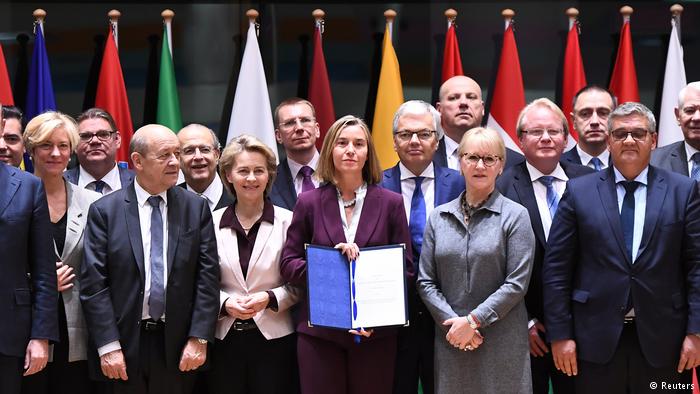US voices concerns over PESCO
February 19, 2018 | Expert Insights

German and French defence ministers recently reiterated their support and dedication to the European Union’s Permanent Structured Cooperation (PESCO). At the Munich Security Conference, US officials expressed concerns that PESCO will divert resources from, and act as an alternative to NATO.
Background
The European Union is a political and economic bloc comprising of 28 independent member states.
The Permanent Structured Cooperation (PESCO) was activated in December 2017 following an announcement that the European Union would increase its defence spending. 25 of the 28 members of the EU are a part of this structure. PESCO is meant to be a framework for structural integration based on the European Union’s Common Security and Defence Policy (under Article 42-46 of the Treaty on European Union). The members of this agreement have committed to enhanced cooperation on defence requirements & resources, supply & force groups, and joint operations. Only the United Kingdom, Denmark, and Malta are not a part of this system.
The North Atlantic Treaty Organization is an intergovernmental military alliance between North American and European countries, including several EU members. It comprises of 29 independent member countries across North America and Europe. It was created in 1949 to counter the threat posed by Soviet Union during the Cold War. The United States is generally considered the de-facto leader of the group.
Article 5 of the North Atlantic Treaty Organization (NATO) is based on the principle of collective defence. It notes that any attack on one of the NATO signatories would be considered an attack on all. Last year, the incumbent US administration did not ratify support for the Article 5 provision. In the run up to the elections, President Trump described NATO as “obsolete”, and suggested that it cost the US too much money. These statements resulted in concern from allies of the United States including members of NATO.
Over the past two years, the EU and the US have had some conflicting stances on world issues. Only this month, for example, the European Union announced that it would provide $53 million to Palestine, weeks after the US announced that it was withdrawing its aid.
Analysis
At the Munich Security Conference, American and NATO representatives expressed their misgivings with regards to PESCO. Previous US administrations had articulated discontent with the lack of European Union spending on defence, leading to confusion amongst some EU officials about this change of stance. The Trump administration in particular has put pressure on NATO member countries to increase defence expenditure.
EU member countries, France and Germany spoke about PESCO at the convention this weekend and promised to up their respective military capabilities. Defence ministers of both countries commented on the strategic autonomy of PESCO, while adding that increased cooperation amongst EU countries could work in tandem with NATO.
The German Minister Ursula von der Leyenurope said, “Europe has to up its pace in the face of global challenges from terrorism, poverty and climate change. Those who want to must be able to advance without being blocked by individual countries.”
The American ambassador to NATO, Kay Bailey Hutchison, warned against PESCO turning into “a protectionist vehicle for EU.” “We’re going to watch carefully, because if that becomes the case, then it could splinter the strong security alliance that we have,” she said.
NATO secretary general Jens Stoletenberg emphasised that the EU must make it clear that PESCO isn’t a substitute for NATO. “It’s important for Europeans to state again and again that this is not competition for NATO or an alternative to NATO… Some doubts remain,” Stoletenberg said. He later added, "European allies are absolutely aware that the defence, the protection of Europe is dependent on NATO." PESCO is meant to strengthen the “European pillar” within NATO.
Some analysts believe that the US is wrong to take issue with PESCO, when it should be focussing on encouraging better collaboration to counter Russia. Others have stated that PESCO shouldn’t focus on strategic autonomy, but on military efficiency.
Assessment
Our assessment is that President Trump’s “America first” rhetoric has caused concern amongst US allies. The United States’ reaction to PESCO demonstrates the Trump regime’s tendency to view other nations as competitors rather than collaborators. Some have speculated that Washington’s concerns lie not with the impact on NATO, but the possible impact on its own defence industry. However, should PESCO lead to a greater consolidation of power by the EU, it could help counter Russian influence in the continent, particularly in parts of Western Europe.








Comments